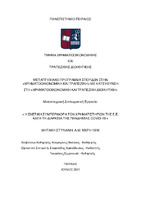Η σχετική συμπεριφορά των χρηματιστηρίων της Ε.Ε. κατά τη διάρκεια της πανδημίας Covid-19

Προβολή/
Λέξεις κλειδιά
Κρίση Covid-19 ; Πανδημική κρίση ; Χρηματιστηριακή συντριβή ; Ευρωπαϊκή Ένωση ; Ευρωπαϊκά χρηματιστήρια ; Χρηματιστηριακοί δείκτες ; STOXX EUROPE 600 ; Μοντέλο αγοράς ; Συντριβή 2020Περίληψη
H παρούσα διπλωματική εργασία επιχειρεί να μελετήσει τη συμπεριφορά των ευρωπαϊκών χρηματιστηριακών αγορών, των κρατών μελών της Ευρωπαϊκής Ένωσης κατά τη διάρκεια της πανδημίας του κορωνοϊού. Για την επίτευξη της έρευνας χρησιμοποιήθηκαν ημερήσια δεδομένα των αντιπροσωπευτικών χρηματιστηριακών δεικτών όλων των χρηματιστηρίων των κρατών μελών της Ευρωπαϊκής Ένωσης και του χρηματιστηριακού δείκτη STOXX EUROPE 600, οποίος χρησιμοποιείται ως δείκτης αναφοράς. Η εξεταζόμενη περίοδος αποτελείται από την 1 Ιανουαρίου 2018 έως τις 30 Οκτωβρίου 2020. Προκειμένου να είναι αντιληπτές οι συμπεριφορές των χρηματιστηριακών δεικτών κατά τη διάρκεια της περιόδου του κορωνοϊού, η δειγματοληψία έχει διαχωριστεί σε τρείς περιόδους, οι οποίες χαρακτηρίζονται ως: α) περίοδος πριν την κρίση, β) περίοδος κρίσης και γ) περίοδος ανάκαμψης. Έπειτα από την ερευνά είναι δυνατό να εξαχθεί το συμπέρασμα ότι στην περίοδο κρίσης όλες οι χρηματιστηριακές αγορές παρουσιάζουν αρνητικές μέσες αποδόσεις με εξαίρεση τη χρηματιστηριακή αγορά της Ρουμανίας, η οποία εμφανίζει θετική μέση απόδοση. Η αστάθεια των ευρωπαϊκών χρηματιστηρίων είναι αυξημένη κατά τη διάρκεια της περιόδου κρίσης σε σχέση με τις άλλες δυο εξεταζόμενες περιόδους. Επιπλέον, τα ευρήματα καταδεικνύουν ότι τα ευρωπαϊκά χρηματιστήρια είναι συνδεδεμένα κατά τη διάρκεια της περιόδου της κρίσης, καθώς εμφανίζουν υψηλές θετικές συσχετίσεις. Εξαίρεση και σε αυτό το σημείο αποτελεί το χρηματιστήριο της Ρουμανίας. Τέλος, γίνεται κατανοητό ότι η γερμανική χρηματιστηριακή αγορά παρασύρθηκε από την πτώση της ευρωπαϊκής αγοράς κατά την περίοδο της κρίσης. Εντούτοις, η ρουμανική χρηματιστηριακή αγορά επωφελήθηκε από την ήδη υπάρχουσα αρνητική συσχέτισή της κυρίως με τον δείκτη αγορά.


